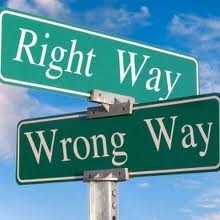Alright folks, out of necessity, at this point in our Torah studies, I need to engage you in a bit of a philosophical dialogue concerning the Scriptural viewpoint of mankind and sin.
Let’s start with basic foundations.
First, every human being without exception, you, me and your next door neighbor, everyone is born with two inclinations or tendencies.
What two inclinations am I talking about?
I’m talking about the good inclination and the evil inclination that are both woven into the very fabric of our souls since birth.
In Hebrew, this is called the YETSER TOV (good inclination) and the YETSER HARAH (evil inclination).
Now here’s a question for you.
What if we hadn’t been created with these two inclinations?
The simple answer is we wouldn’t have wills…
…which is another way of saying we wouldn’t have freedom.
Instead, we would have been created as robots, mindless bodies without the ability to make our own choices.
Think about it.
What is the purpose of a will anyway?
The will is that component of a human that enables us to make moral choices.
And what exactly is a “moral choice”?
Scripturally speaking, a moral choice is any decision or action exercised by our wills that is in alignment with God’s character and His Will.
That’s really it.
A decision we make that is in harmony with God’s Will is a moral choice.
Conversely, a decision we make that is NOT in harmony with God’s Will is an immoral choice.
Or another way to put it is…
…the decisions we make that are in alignment with God’s Will are what the Scripture calls OBEDIENCE.
And the decisions we make that go against God’s will are what the Scripture calls SIN.
Easy enough to understand, right?
Another really simple way to put it is…
…a human being having a good inclination and an evil inclination…
…is the same thing as saying a human being has the ability to make moral choices.
Here’s the thing and I touched on this yesterday.
Adam and Eve were created with the ability to make moral choices.
BUT…
…until God gave them that one rule Torah to not eat from the Tree of Knowledge and Good and Evil, there was no way for them to be able to exercise that capacity to make moral (or immoral) choices.
In other words, sinning was not even a possibility for them.
Because…
…in order to be able to make a moral choice, you also have to have the option to make an immoral choice.
You cannot have one without the other.
A will cannot function without any moral choices to make.
And that is the purpose of the Law or God’s Torah.
It gives us the incredible opportunity and freedom to exercise our wills and make moral choices…
…on a daily basis!
However, in addition to moral choices, there’s actually a second category of choices that mankind has.
Do you have any idea what that might be?
The other category of choices we human beings have is that of “preferences”.
What are some examples of preferences?
For instance…
“Should I have spaghetti or a tuna sandwich for dinner tonight?”
“Should I wear my red shirt or my purple shirt to the party?”
“Should we go to Thailand or the Philippines for our summer vacation?”
In general, these are all examples of preferences.
Now you may be wondering what is a good hard and fast rule we can go by in order to tell the difference between whether a decision lies within the realm of preference or whether it lies within the realm of moral choice?
Let me try and answer that for you in a simple way.
Any decision made that does NOT involve good and evil as defined in God’s Torah is a preference.
And any decision that does involve good and evil as defined in God’s Torah is a moral choice.
Based on this definition, let me ask you this.
Is the decision to eat pork a moral choice or a mere preference?
According to God’s Torah, the decision to eat pork or not IS A MORAL CHOICE.
However, the gentile church would have you believe otherwise.
In fact, they go so far as to teach that Yeshua moved God’s commands away from the realm of moral choice to the realm of preference.
Can you now see why the church can be so messed up in in their immorality?
This is precisely why the church can take an issue like homosexuality, a matter that lies clearly within the realm of moral choice and boldly and with a straight face say it lies within the realm of preference.
Now here’s another thing you’ve got to understand.
God did not give us a free will to make choices that lie within the realm of preference.
Nope…the very purpose of our human wills (or our good and evil inclinations) is to make moral choices.
Again, that is why God has given us free will.
And this is the very purpose of our lives.
To do God’s Will…
…on a daily basis.
And we don’t have to guess what God’s Will is.
Because right here in this Torah we are studying, we are given God’s do’s and don’ts and rights and wrongs so we can know what is good or evil and make the proper moral choices.
Remember, God’s Torah is not a book of suggestions for preferences in our daily lives.
It is the only book in the universe that sets down the parameters and boundaries for moral choices.
So we don’t have to stumble and wander around in the dark and wonder and guess what God’s Will is.
Unless of course, you adopt some ridiculous doctrine that says God’s Law has been done away with.
Then you’re really in the dark.




Leave a Reply